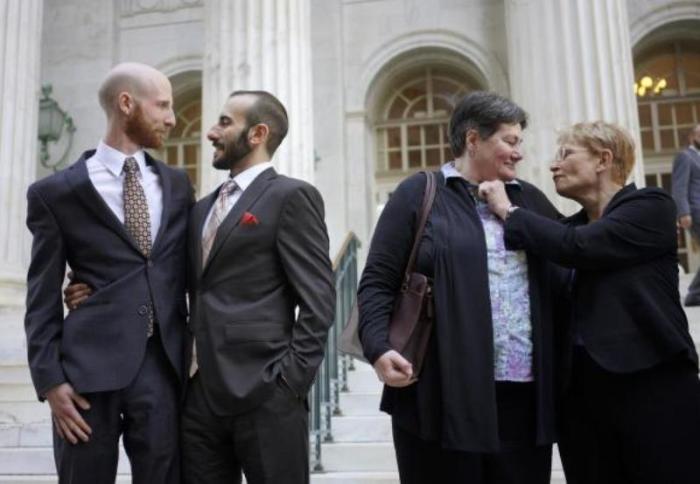Supreme Court Decision Will Make Gay Marriage Legal in 30 States; Court Watched 'Marriage Burn to Ashes' Says Conservative Group

Monday's unexpected Supreme Court ruling not to get involved in the national debate over same-sex marriage is expected to eventually bring the number of states where gay marriage is legal to 30 as lower court rulings in support of the practice are allowed to stand.
Conservative groups criticized the Court's decision for letting stand lower court decisions that overturned state-level marriage laws approved by voters in those states.
Prior to Monday's decision, 19 states and Washington, D.C., permitted same-sex marriages. Highlighting the national picture on same-sex marriage, USA Today noted that the Supreme Court's decision on Monday left in place lower court rulings legalizing gay marriage in 11 additional states.
Virginia, Indiana, Wisconsin, Oklahoma and Utah were affected immediately by the decision as federal appeals courts had struck down gay marriage bans in those states. North Carolina, South Carolina, West Virginia, Colorado, Kansas and Wyoming are also now likely affected as a result of the Supreme Court's decision because their judicial circuits are covered by the same appellate courts that struck down the gay marriage bans in the five immediately affected states.
The report noted that the number of states where same-sex marriage is legal could increase beyond 30 if the Supreme Court stays out of the marriage debate. If the 9th Circuit Court of Appeals overturns marriage laws in Idaho and Nevada, the number of states legalizing same-sex marriage could expand to 35 as the ruling would also affect Alaska, Arizona and Montana.
"The court's letting stand these victories means that gay couples will soon share in the freedom to marry in 30 states, representing 60 percent of the American people," Evan Wolfson, president of Freedom to Marry told USA Today. "But we are one country, with one Constitution, and the court's delay in affirming the freedom to marry nationwide prolongs the patchwork of state-to-state discrimination and the harms and indignity that the denial of marriage still inflicts on too many couples in too many places."
Despite the celebration of gay marriage supporters however, conservative groups reacted strongly to the surprise decision Monday with most decrying the move.
"Unfortunately, by failing to take up these marriage cases, the High Court will allow rogue lower court judges who have ignored history and true legal precedent to silence the elected representatives of the people and the voice of the people themselves by overturning state provisions on marriage," explained Family Research Council President Tony Perkins in a release Monday.
"Even more alarming, lower court judges are undermining our form of government and the rights and freedoms of citizens to govern themselves. This judicially led effort to force same sex 'marriage' on people will have negative consequences for our Republic, not only as it relates to natural marriage but also undermining the rule of and respect for law," he said.
Mat Staver, founder and chairman of Liberty Counsel, a conservative legal advocacy group, skewered the high court Monday for choosing to watch "marriage burn to ashes."
He also called the Supreme Court's decision "a total dereliction of duty."
"The Supreme Court abandoned its duty to take up or at least hold these marriage cases. The responsibility for the undermining of marriage rests solely at the U.S. Supreme Court. Last year's decision in the Defense of Marriage Act case that started this fire, and today's decision to watch marriage burn to ashes is the responsibility of the Supreme Court," said Staver in a statement.
"The actions of the Supreme Court in particular, and of the judiciary in general, undermine the rule of law and erode the confidence of the people in the judicial branch of government. When the people lose confidence in the rule of law, the judiciary will lose is legitimacy. Everyone will be affected by same-sex marriage because it is an intolerant agenda that will directly collide with religious freedom," he added.
Brian S. Brown, president of the National Organization for Marriage was a bit hopeful in his comments.
"It's possible that the Supreme Court wants to wait to take a case when a Circuit split develops so that it can rule in favor of the people's right to define marriage as it has always been defined. We're hopeful that the 6th Circuit Court of Appeals will rule in our favor and that the Supreme Court will then take that case and decide that marriage is not unconstitutional," he noted in a statement.





























